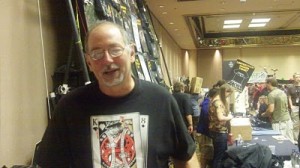I see from Engadget that some wacky scientists at a “defense”-related (quasi?)-governmental research laboratory have invented a “cyberpunky” electronic skin using nanotechnology:
Researchers working for the Department of Energy’s Berkeley Lab have figured out how to create relatively inexpensive “electronic skin” comprising carbon nanotubes enriched with semiconductors. Their process involves an enriched single walled carbon nanotube (SWNT) solution embedded in a honeycomb pattern of hexagonal holes. . .
The article goes on to say that this is a development reminiscent of the novels of William Gibson et al. But Gibson’s not the cyberpunk author that this story brought to my mind. I thought of John Jurek, whose 2000 self-published novel KaeLF Skin was about just such an artificial skin and the various fun and vicious uses it could be put to.† If I remember right, Jurek’s KaeLF Skin was invented at a quasi-governmental research lab — perhaps even Berkeley itself; I can’t seem to find my copy of the book right now to fact-check. But in any event, much of the book concerns Berkeley Laboratory-type doings. The Engadget article could have been ripped from KaeLF Skin’s prologue, that’s how close Jurek’s book is to this story.
I forget how John and I discovered each other’s books, but since we had both written and published cyberpunky thrillers based on nanotech themes, we agreed to do a book swap: he sent me an iUniverse (printed) copy of KaeLF Skin and I sent him a copy of my Acts of the Apostles.† He wrote a glowing review of my book for the Midwest Book Review,(alas, since confined to oblivion), and an abbreviated version of that glorious review for Amazon. I wrote a positive but somewhat less glowing review of his book and posted it on Amazon. After that we exchanged emails for a few months, and I remember that he was pretty down about the poor reception that his book gotten– like most self-published novels KaeLF Skin didn’t sell many copies and got few reviews.
My original review of KaeLF Skin, which I posted on Amazon, is below. Continue reading





